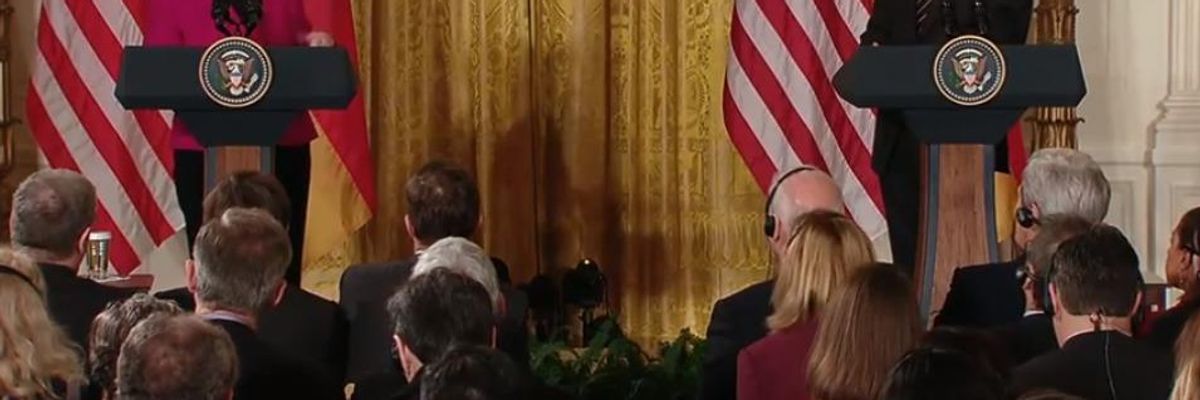Despite indications that further militarization will only worsen fighting on the ground, President Obama said Monday that should upcoming peace talks fail, he will consider sending "lethal defensive weapons" to Ukraine.
The U.S. president made the comment during a joint news conference with German Chancellor Angela Merkel, who ahead of upcoming peace negotiations came to Washington to discuss the ongoing crisis.
Though he acknowledged that the likelihood of a military solution is low, especially given the strength of Russian forces, Obama said that among the options being weighed by his administration is the possibility of arming Ukraine.
"If, in fact, diplomacy fails, I've asked my team to look at all options, what other means can we put in place to change Mr. [Vladimir] Putin's calculus," Obama said. "And the possibility of lethal defensive weapons is one of those options that's being examined. But I have not made a decision on that yet."
The proposal is "not based on the idea that Ukraine could defeat the Russian army," he continued, but rather the aim would be to "bolster its defenses in the face of separatist aggression."
Merkel, on the other hand, said that she and French President Francois Holland have committed to "make one further attempt" to secure a diplomatic agreement. The leaders of Russia, Ukraine, Germany and France reportedly spoke by phone over the weekend and are planning to meet in Minsk, Belarus on Wednesday to try to broker a new ceasefire agreement.
Merkel displayed little optimism for the success of the talks, but said she does "not see a military solution to this conflict."
To which Obama added: "We can't simply try to talk them out of it. We have to show them that the world is unified in imposing a cost for this aggression."
Later, a reporter from the German press asked Merkel: "What is red line across which the Ukrainian army must be armed? And what can the Nobel laureate Obama do more to defuse this conflict?" Neither leader appeared to respond directly to the question.
On Friday, the UN's Office of the High Commissioner for Refugees issued a statement warning that fighting near the separatist stronghold Donetsk has pushed the number of registered internally displaced people to nearly 1 million people, with an additional 600,000 Ukrainians seeking asylum in neighboring countries.
According to the press statement: "The lack of access to public services previously provided by the central authorities has drastically worsened the plight of the civilian population in areas not under government control. This has been further aggravated by restrictions to the movement of people and goods."
UNHCR spokesperson Adrian Edwards said the organization "maintains its call on all parties to the conflict to refrain from any actions that might endanger the life of civilians and to adhere to the principles of international humanitarian law."
Last month, the UN's Office of the High Commissioner for Human Rights reported that over 5,000 people have been killed and over 10,000 wounded since the conflict broke out last year.
Also Monday, the European Union agreed to even more sanctions against Russians and pro-Russian separatists but will delay their implementation until after the talks.
Reutersreports:
EU foreign ministers adopted asset freezes and visa bans on 19 Ukrainian separatists and Russians and nine organizations, but said they would not take effect until Feb. 16.
"The principle of these sanctions remains but the implementation will depend on results on the ground," French Foreign Minister Laurent Fabius told reporters.

